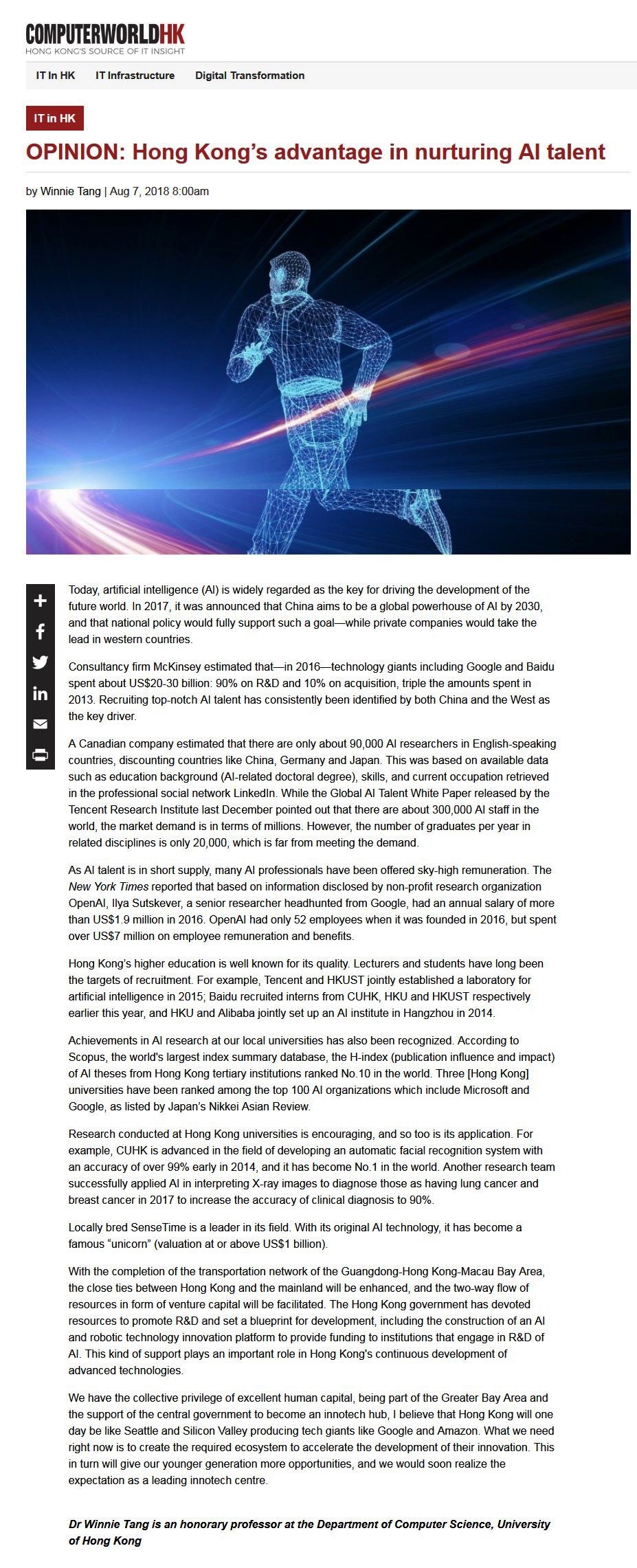網上版請按此

OPINION: Hong Kong's advantage in nurturing AI talent
Today, artificial intelligence (Al) is widely regarded as the key for driving the development of the future world. In 2017, it was announced that China aims to be a global powerhouse of AI by 2030, and that national policy would fully support such a goal—while private companies would take the lead in western countries.
Consultancy firm McKinsey estimated that—in 2016—technology giants including Google and Baidu spent about US$20-30 billion: 90% on R&D and 10% on acquisition, triple the amounts spent in 2013. Recruiting top-notch AI talent has consistently been identified by both China and the West as the key driver.
A Canadian company estimated that there are only about 90,000 AI researchers in English-speaking countries, discounting countries like China, Germany and Japan. This was based on available data such as education background (AI-related doctoral degree), skills, and current occupation retrieved in the professional social network LinkedIn. While the Global AI Talent White Paper released by the Tencent Research Institute last December pointed out that there are about 300,000 AI staff in the world, the market demand is in terms of millions. However, the number of graduates per year in related disciplines is only 20,000, which is far from meeting the demand.
As AI talent is in short supply, many AI professionals have been offered sky-high remuneration. The New York Times reported that based on information disclosed by non-profit research organization OpenAI, Ilya Sutskever, a senior researcher headhunted from Google, had an annual salary of more than US$1.9 million in 2016. OpenAI had only 52 employees when it was founded in 2016, but spent over US$7 million on employee remuneration and benefits.
Hong Kong's higher education is well known for its quality. Lecturers and students have long been the targets of recruitment. For example, Tencent and HKUST jointly established a laboratory for artificial intelligence in 2015; Baidu recruited interns from CUHK, HKU and HKUST respectively earlier this year, and HKU and Alibaba jointly set up an AI institute in Hangzhou in 2014.
Achievements in AI research at our local universities has also been recognized. According to Scopus, the world's largest index summary database, the H-index (publication influence and impact) of AI theses from Hong Kong tertiary institutions ranked No.10 in the world. Three [Hong Kong] universities have been ranked among the top 100 AI organizations which include Microsoft and Google, as listed by Japan's Nikkei Asian Review.
Research conducted at Hong Kong universities is encouraging, and so too is its application. For example, CUHK is advanced in the field of developing an automatic facial recognition system with an accuracy of over 99% early in 2014, and it has become No.1 in the world. Another research team successfully applied AI in interpreting X-ray images to diagnose those as having lung cancer and breast cancer in 2017 to increase the accuracy of clinical diagnosis to 90%.
Locally bred SenseTime is a leader in its field. With its original AI technology, it has become a famous "unicorn" (valuation at or above US$1 billion).
With the completion of the transportation network of the Guangdong-Hong Kong-Macau Bay Area, the close ties between Hong Kong and the mainland will be enhanced, and the two-way flow of resources in form of venture capital will be facilitated. The Hong Kong government has devoted resources to promote R&D and set a blueprint for development, including the construction of an AI and robotic technology innovation platform to provide funding to institutions that engage in R&D of AI. This kind of support plays an important role in Hong Kong's continuous development of advanced technologies.
We have the collective privilege of excellent human capital, being part of the Greater Bay Area and the support of the central government to become an innotech hub, I believe that Hong Kong will one day be like Seattle and Silicon Valley producing tech giants like Google and Amazon. What we need right now is to create the required ecosystem to accelerate the development of their innovation. This in turn will give our younger generation more opportunities, and we would soon realize the expectation as a leading innotech centre.
Dr. Winnie Tang
Honorary Professor, Department of Computer Science, The University of Hong Kong